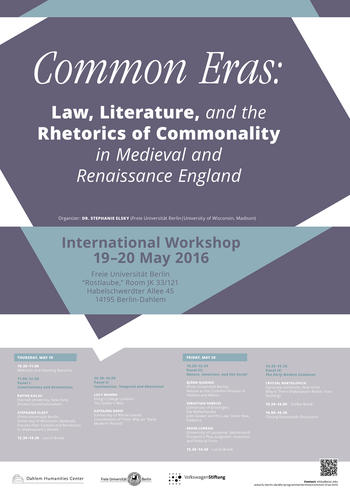Workshop: Common Eras: Law, Literature, and the Rhetorics of Commonality in Medieval and Renaissance England
Workshop Organizer: Stephanie Elsky (VW Fellow at the Dahlem Humanities Center)
19.05.2016 - 20.05.2016
This workshop explores the “commons” in its many possible forms via the intersections of law, politics, rhetoric and literature in medieval and early modern England. It addresses questions including: To what extent do literature and rhetoric imagine a similar commons to that articulated in law and politics? How might recognizing a range of different kinds of commons change our understanding of literary practice in premodern England? How might it reshape our period divides and boundaries? By bringing together a group of international scholars from across the medieval/early modern divide, this workshop intervenes in an ongoing critical conversation about the scholarly practice of periodization from the perspective of law and literature.
Thursday, May 19, 2016
10.30-11.00: Welcome and Opening Remarks
11.00-12.30: Panel I: Constitutions and Revolutions
Rayna Kalas (Cornell University, New York), Ancient Constitutionalism
Stephanie Elsky (Freie Universität Berlin and University of Wisconsin, Madison), Futures Past: Custom and Revolution in Shakespeare’s Hamlet
12.30-14:30: Lunch Break
14.30-16.00: Panel II: Continuities, Temporal and Rhetorical
Lucy Munro (King’s College London), The Spider’s Web
Kathleen Davis (University of Rhode Island), Convolutions of Time: Why an “Early Modern” Period?
Friday, May 20, 2016
10.30-12.45: Panel III: Nature, Invention, and the Social
Björn Quiring (Freie Universität Berlin), Nature as the Common Ground of Hobbes and Milton
Sebastian Sobecki (University of Groningen, the Netherlands), John Gower and the Law: Some New Evidence
Kevin Curran, (University of Lausanne, Switzerland), Prospero’s Plea: Judgment, Invention, and Political Form
12.45-14.45: Lunch Break
14.45-15.30: Panel IV: The Early Modern Commons
Crystal Bartolovich (Syracuse University, New York), Why Is There Shakespeare Rather than Nothing?
16.00-16.30: Closing Roundtable Discussion
In cooperation with


